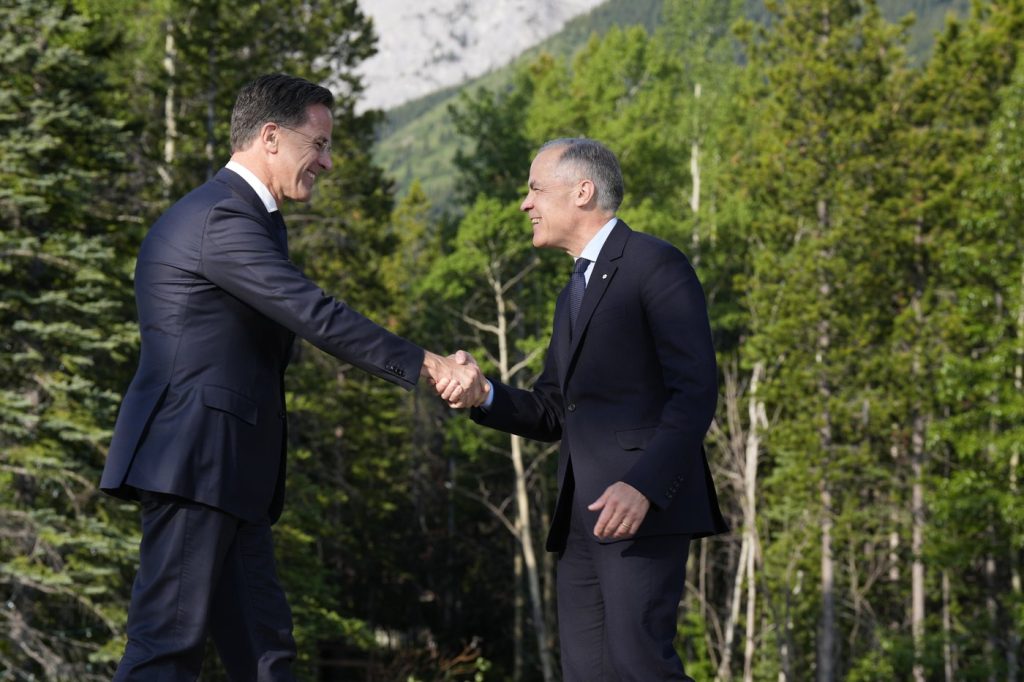OTTAWA – Prime Minister Mark Carney is set to embark on a crucial trip to Europe on Sunday, attending two significant summits focused on security and defense commitments for Canada. Joined by Foreign Affairs Minister Anita Anand, Defence Minister David McGuinty, and Secretary of State for Defence Procurement Stephen Fuhr, Carney will participate in both the EU and NATO summits. The primary topics of discussion will include military procurement and the diversification of supply chains.
This international engagement comes amid Canada’s efforts to lessen its reliance on the United States for defense procurement, a reaction to strained relations characterized by tariff disputes and President Donald Trump’s controversial remarks about Canada potentially becoming a U.S. state.
The trip will commence in Brussels, Belgium, where Carney will first pay respects at the Antwerp Schoonselhof Military Cemetery, the final resting place of 348 Canadian soldiers. Following this visit, he is scheduled to meet with Belgian Prime Minister Bart De Wever, European Council President António Costa, and European Commission President Ursula von der Leyen.
During the EU-Canada summit, Minister Anand and Minister McGuinty are expected to finalize a groundbreaking security and defense agreement with the EU. One European official has described this agreement as one of the most ambitious deals Europe has ever negotiated with a non-member country. This deal will pave the way for Canada’s involvement in the ReArm Europe initiative, granting access to a substantial 150 billion euro loan program dedicated to defense procurement, known as Security Action for Europe.
Following the establishment of the procurement deal, a Canadian official indicated that Canada would need to negotiate a bilateral agreement with the European Commission to facilitate discussions with individual member states regarding procurement opportunities. While the initial agreement will allow Canada to engage in certain joint procurement projects, a second agreement will be necessary for Canadian companies to submit bids.
Leaders at the EU-Canada summit also plan to issue a joint statement expressing their collective intent to maintain pressure on Russia, which could include additional sanctions, and to advocate for an immediate and permanent ceasefire in Gaza.
After concluding activities in Brussels, Carney will travel to The Hague in the Netherlands for the NATO leaders’ summit, slated for Tuesday and Wednesday. During this summit, Carney is set to meet with the King of the Netherlands and engage with leaders from Nordic nations to discuss critical issues surrounding Arctic and transatlantic security.
The NATO summit agenda includes a notable social dinner hosted by the Dutch monarchs and a two-and-a-half hour meeting of the North Atlantic Council. One of the significant discussions among NATO allies will be a proposal to increase the defense spending target for member nations to five percent of their national GDP. Current NATO data reveals that in 2024, not a single one of the 32 member countries met this target.
The Canadian government official briefing on the summit outlined ongoing discussions about the spending target’s timeline, with suggestions ranging from a seven-year to a decade-long timeframe. Historically, Canada hasn't reached the five percent defense spending threshold since the 1950s and last met the two percent mark in the late 1980s. According to NATO, Canada spent $41 billion on defense in 2024, accounting for 1.37 percent of its GDP, a stark contrast to the $20.1 billion spent in 2014, which represented only 1.01 percent of GDP.
In 2014, only three NATO members—the U.S., the U.K., and Greece—met the two percent target. However, by 2025, all members are expected to achieve this goal. Any consensus on adopting the new spending benchmark must be ratified by all 32 NATO member states.
Former Canadian ambassador to NATO, Kerry Buck, noted that the streamlined agenda at the summit is likely intended to minimize public disputes among allies, particularly in light of Trump’s unpredictable influence. Buck commented on the shifting national security environment, particularly for allies neighboring Russia, underscoring the increased vulnerability and the potential risk of U.S. decisions undermining NATO.
Carney’s previous trips to Europe this year included visits to London and Paris and attendance at the inaugural mass of Pope Leo XIV in Rome. This report, detailing significant developments in Canada’s international defense commitments, originally appeared on June 22, 2025.











